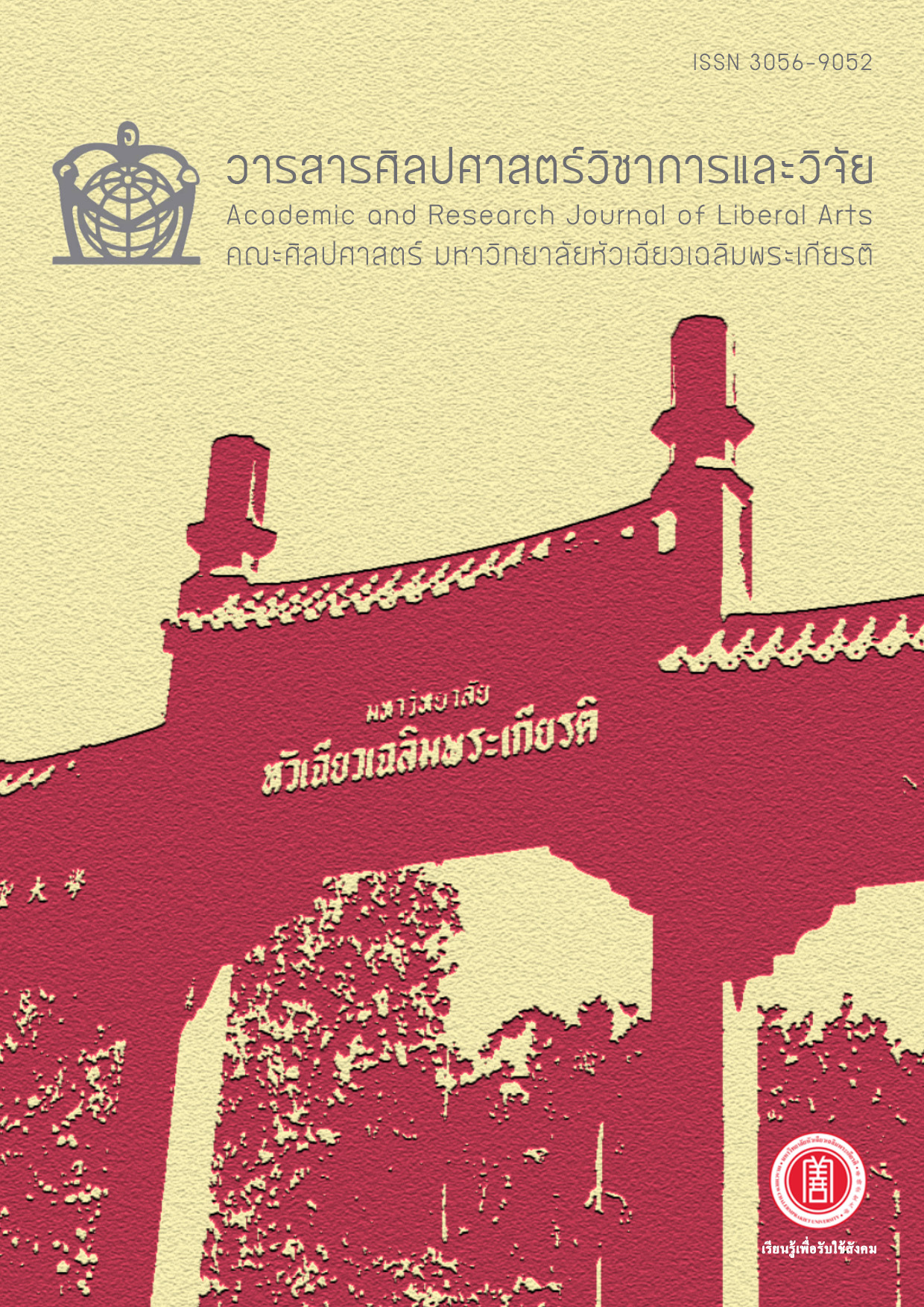The Analysis of Approaches to Low Carbon Tourism Management in Thailand by Using Koh Mak Island, Trat Province as a Case Study
DOI:
https://doi.org/10.14456/arjla.2024.16Keywords:
Low-carbon tourism, Koh Mak Island, Sustainability, Energy ConservationAbstract
The objectives of this study are to 1) examine the components of low-carbon tourism from academic sources 2) examine the practical management of low-carbon tourism in the Koh Mak Island area, Trat province, based on data from various media sources and 3) to analyze and determine suitable management strategies for the low-carbon tourism in Thailand. This study collected data from 2 sources: a) academic sources from the TCI database and Google Scholar and b) media sources presenting information about low-carbon tourism in Koh Mak Island, using content analysis to analyze the data. The study found that 1) the components of carbon tourism from academic sources were summarized and synthesized into 8 components: low-carbon communities, low-carbon tourist attractions, low-carbon accommodations, low-carbon food, low-carbon activities, low-carbon transportation, network cooperation, and publicity. 2) The management of the low carbon tourism in Koh Mak Island, Trat province was categorized into 9 components. The 1st – 8th components were similar to the first finding while the 9th was energy management. 3) The analysis of approaches of low carbon tourism management in Thailand through integrating the first and second findings was derived 9 concepts. The current study is expected to fulfill the body of knowledge regarding low-carbon tourism that communities and relevant organizations can apply to enhance and develop low-carbon tourism management. These strategies aim to promote effective management practices for low-carbon tourism in Thailand, fostering sustainability for the future.
References
ชาคริต อ่องทุน และนรินทร์ สังข์รักษา. (2561). การวิจัยเชิงปฏิบัติการแบบมีส่วนร่วมในการจัดการท่องเที่ยวแบบคาร์บอนต่ำตามบริบทการพัฒนาประเทศไทย 4.0 ชุมชนในภาคตะวันออกของไทย (ดุษฎีนิพนธ์ปริญญาดุษฎีบัณฑิต). บัณฑิตวิทยาลัย, มหาวิทยาลัยศิลปากร, นครปฐม. ค้นคืนจาก http://ithesis-ir.su.ac.th/dspace/handle/123456789/1651.
ชาคริต อ่องทุน และนรินทร์ สังข์รักษา. (2562). การปฏิบัติที่เป็นเลิศในการจัดการท่องเที่ยวแบบคาร์บอนต่ำ: กรณีศึกษาชุมชนในภาคตะวันออกของไทย. วารสารวิทยาลัยดุสิตธานี, 13(2), 374-384.
เดอะคลาวด์. (2565). Low Carbon Destination. ค้นคืนจาก https://readthecloud.co/ kohmak-resort-trat/.
วณิชชา แก้วสุวรรณ์ และศุภิกา วานิชชัง. (2564). การประเมินการปลดปล่อยก๊าซเรือนกระจกจากกิจกรรมการ แข่งขันเรือพายชิงแชมป์แห่งประเทศไทย (วิทยานิพนธ์ปริญญามหาบัณฑิต). มหาวิทยาลัยศรีนครินทรวิโรฒ, กรุงเทพมหานคร.
ณัฎฐกานต์ พฤกษ์สรนันทน์ และอดาร์ช บาตรา. (2561). การท่องเที่ยวอาหารแบบคาร์บอนต่ำโดยมะพร้าว เกาะสมุย ประเทศไทย. วารสารวิทยาลัยดุสิตธานี, 12 Special (2018): ครบรอบ 25 ปี วิทยาลัยดุสิตธานี, 231-247.
ธารีทิพย์ เหล่าวิโรจนกุล และอัศวิน แสงพิกุล. (2566). การวิเคราะห์องค์ความรู้เกี่ยวกับงานวิจัยด้านการท่องเที่ยวแบบคาร์บอนต่ำ: แนวทางสู่การท่องเที่ยวอย่างยั่งยืน. วารสารศิลปศาสตร์ปริทัศน์, 18(1), 129-143.
ปิยะวิทย์ ทิพรส และอัศวิน แสงพิกุล. (2565). การวิเคราะห์์งานวิจัยและคำวิจารณ์ของลูกค้าในธุรกิจเชิงสุขภาพประเภทเดย์สปา. วารสารการบริหารและสังคมศาสตร์์ปริทรรศน์์, 5(3), 75-87.
สรัญญา จันทร์ชูสกุล. (2560). การประเมินคุณภาพวิทยานิพนธ์เกี่ยวกับการพัฒนาความคิดสร้างสรรค์ของนักเรียนระดับประถมศึกษา. วารสารอิเล็กทรอนิกส์ Veridian มหาวิทยาลัย, 10(2), 160-175.
องค์การบริหารการพัฒนาพื้นที่พิเศษเพื่อการท่องเที่ยวอย่างยั่งยืน. (2558). อพท. 1 ชูแบรนด์ Low Carbon Holiday มัดใจนักท่องเที่ยวคุณภาพสู่จังหวัดตรา. ค้นคืนจาก: http://www.trattown.com/th/travel/low-carbon-holiday.
อะเมซซิ่งไทยแลนด์. (2566). อะไรเอ่ย 17 STGs มารู้จัก 17 เป้าหมายสู่การท่องเที่ยวอย่างยั่งยืน. ค้นคืนจาก https://www.facebook.com/AmazingThailand/posts/pfbid02s9DoogB9q6Pec ESFb8zFpVM5Z67 RRkgikiLiGrtHo4afEPdnRSt7cSFiU3pdqejml.
อัศวิน แสงพิกุล. (2558). การเปรียบเทียบการจัดนำเที่ยวเชิงนิเวศของผู้ประกอบการเพื่อพัฒนาธุรกิจการท่องเที่ยวสีเขียวอย่างมีคุณภาพ: กรณีศึกษาผู้ประกอบการในเกาะภูเก็ตและเกาะบาหลี. วารสารสุทธิปริทัศน์. 30(93). 275-294.
Apivantanaporn, T. & Walsh, J. (2016). The low carbon tourism paradox: Evidence from Koh Mak. Quaestus, (9), 9-20.
Chookietwana, J., Sereenonchai, S., Arunrat, N., & Yuttitham, M. (2021). Communication Strategies of Natural Resources and Environmental Protection Volunteer (NEV) to Drive Low Carbon Community: A Case Study of Ban Tor Phae, Khun Yuam District, Mae
Hong Son Province. In The 8th Business Economics and Communications International Conference, Phisanulok (pp. 119-125).
Gefen, Z. (2013). Research on Low-carbon Rural Tourism Development in Western Minority Regions in China —from the perspective of Neo institutional economics. Journal of Contemporary Research in Business, 10(4), 117-125.
Fakfare, P. & Wattanacharoensil, W. (2023). Low-carbon tourism: determining domestic tourist perception from Thailand: TOURISM AGENDA 2030. Tourism Review, 78(2), 496-516.
Hanpattanakit, P., Pimonsree, L., Jamnongchob, A., & Boonpoke, A. (2018). CO2 emission and reduction of tourist transportation at Kok Mak Island, Thailand. Chemical Engineering Transactions, 63, 37-42.
Nguyen, H. A. T., Gheewala, S. H., Sophea, T., Areerob, T., Hashimoto, K., Pimonsree, S., & Prueksakorn, K. (2020). Comparative carbon footprint assessment of agricultural and tourist locations in Thailand. Journal of Cleaner Production, 269, 122407.
Sukcharoenchok, M. N. & Rado, I. (2019). The impacts of community-based tourism on economic, social, and environmental dimensions for the local communities in Thailand. (Master’s thesis, School of Global Studies, Thammasat University). Bangkok, Thailand.
Sununta, N., Kongboon, R., & Sampattagul, S. (2019). GHG evaluation and mitigation planning for low carbon city case study: Dan Sai Municipality. Journal of Cleaner Production, 228, 1345-1353. https://doi.org/10.1016/j.jclepro.2019.04.312.
Downloads
Published
How to Cite
Issue
Section
License
Copyright (c) 2024 Academic and Research Journal of Liberal Arts (Online)

This work is licensed under a Creative Commons Attribution-NonCommercial-NoDerivatives 4.0 International License.
บทความที่ได้รับการตีพิมพ์เป็นลิขสิทธิ์ของวารสารศิลปศาสตร์วิชาการและวิจัย
ข้อความที่ปรากฏในบทความแต่ละเรื่องในวารสารวิชาการเล่มนี้เป็นความคิดเห็นส่วนตัวของผู้เขียนแต่ละท่านไม่เกี่ยวข้องกับมหาวิทยาลัยหัวเฉียวเฉลิมพระเกียรติ และคณาจารย์ท่านอื่นๆ ในมหาวิทยาลัยฯ แต่อย่างใด ความรับผิดชอบองค์ประกอบทั้งหมดของบทความแต่ละเรื่องเป็นของผู้เขียนแต่ละท่าน หากมีความผิดพลาดใดๆ ผู้เขียนแต่ละท่านจะรับผิดชอบบทความของตนเองแต่ผู้เดียว




